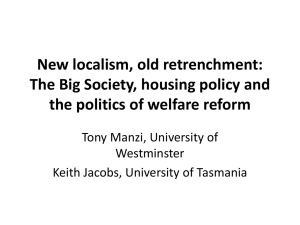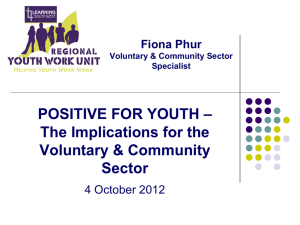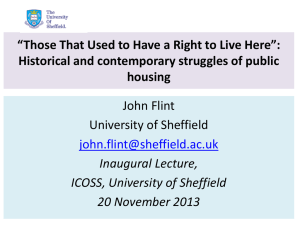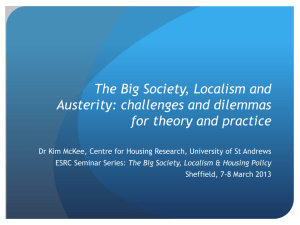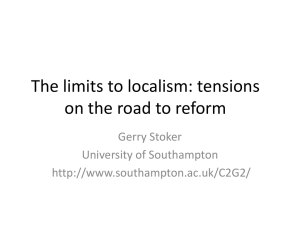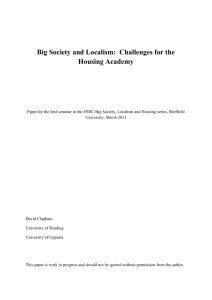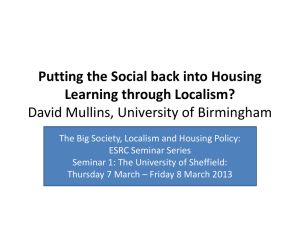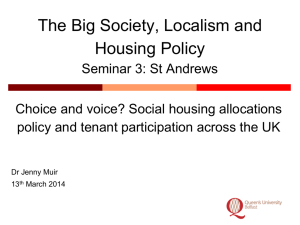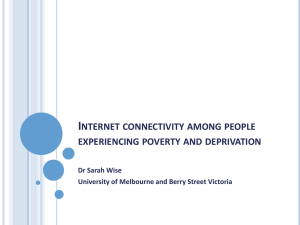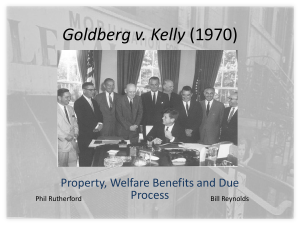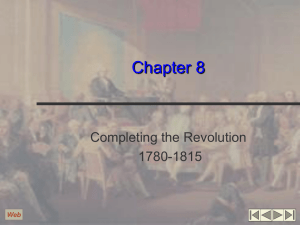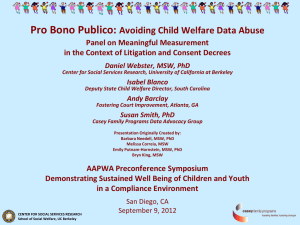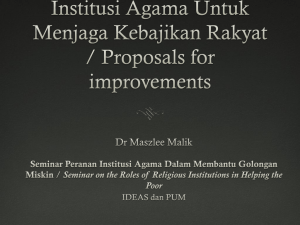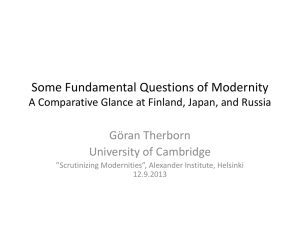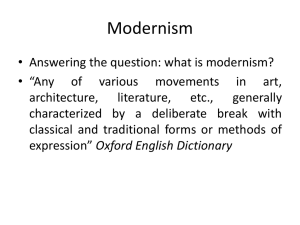John Flint - The Big Society, Localism & Housing Policy
advertisement
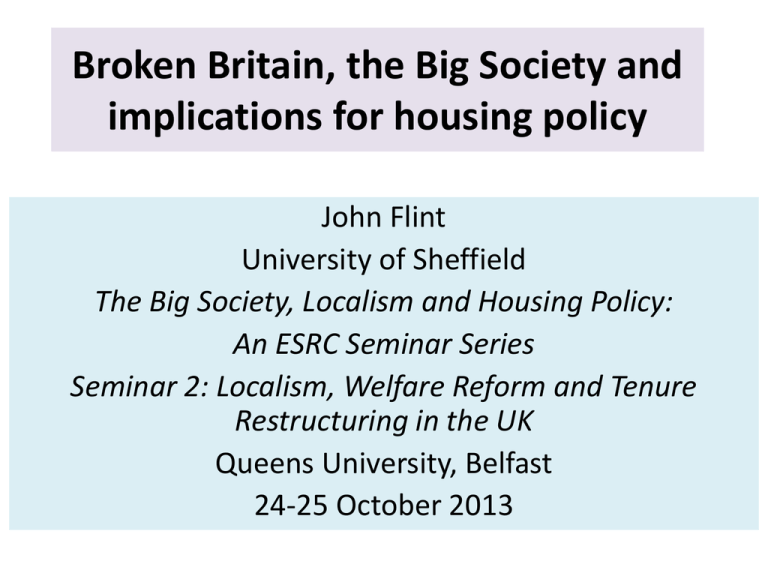
Broken Britain, the Big Society and implications for housing policy John Flint University of Sheffield The Big Society, Localism and Housing Policy: An ESRC Seminar Series Seminar 2: Localism, Welfare Reform and Tenure Restructuring in the UK Queens University, Belfast 24-25 October 2013 Outline • Broken Britain and the 2011 riots • The Big Society and Localism • Redefining government and reframing crisis as norm • Housing, localism and the Big Society • “Middle-class young ‘will fare worse than their parents.’” Headline in The Observer, 12 October 2013 (based on the report of The Social Mobility and Child Poverty Commission, see Boffey, 2013) Broken Britain: New Labour and domo-politics • New Labour’s social exclusion paradigm: cultural (and moral) dynamics of material poverty and social capital • New Labour and the Respect Agenda: “Values necessary to support respect are becoming less widely held” (Respect Task Force, 2006:5) • Walters (2004) and domo-politics: a move from (rational)political economy to governance through emotion and belonging: • ‘expectation’ ‘fairness’ and ‘localness’ rather than ‘need’, ‘strategy’ and ‘calculation’ The Right and Broken Britain • Social Justice Policy Group (2006) Breakdown Britain: underclass • Alan Duncan MP, 2007: a need to ‘re-civilise Britain’ to counter ‘a real life Lord of the Flies’ • Browne (2008): ‘Despite some moral improvements’, family breakdown, drug and alcohol abuse and welfare dependency have ‘unequivocally increased’ in the last two decades with ‘an evident’ decline in social capital • Conservative Party (2010): Labour’s Two Nations • David Cameron (2010): “Huge cultural changes will be required within communities lacking the abilities to cope with modern life” (emphasis added) The 2011 Riots • David Cameron (2011): ‘A complete absence of self-restraint’ and a ‘slow motion moral collapse that has taken place in parts of our country these past few generations.’ • Emphasis on geography and generations • Cameron (2011): “A social fight back.” A perpetual crisis of the present • “age of insecurity”, “loss of ontological security”, “age of anxiety”, “angst society”, “governmentality of unease”; “liquid life”, vertigo of modernity” (Judt, 2010; Scott, 2000; Giddens, 1990; Gilbert,2009; Beck, 1992; Young, 2007) • Advanced urban marginality (Wacquant, 2008) and the precariat (Standing, 2011) • BUT… • Perceived periods of crisis are ubiquitous in urban history (Beatrice Webb on the 1920s:‘moral miasma…atmosphere of morbid alcoholism and sexuality, furtive larceny and unashamed mendacity…a barbarous underclass.’) • Empirical evidence contested (see Griffith et al., 2011 and Mooney, 2009). The Big Society and Localism • New Labour’s ‘double devolution’: returning power to (and from) town halls • Stock transfer and community ownership (GHA and second stage transfer) • “For too long central government has hoarded and concentrated power” (CLG, 2011) • “The time has come to disperse power more widely in Britain today…and to pass power back to where it belongs” (CLG, 2011) Big Society as an associative figuration • Big Society is an ‘associative figuration’ (Barker, 1960), implying contracts of governance (as with the ‘nation’ and ‘welfare’ state) • A mechanism for naming the world (Bourdieu, 1984) • Based on a perceived subversion of the welfare state and the underpinning social contract • Premised on Victorian (not welfare state)philanthropy and voluntarism and laissez faire/elite localism, not municipalism • Localism Act: Neighbourhood planning; influence on planning decisions; right to build; community infrastructure levy • Autonomy and flexibility for local authorities and “localness” in social housing allocations • Enhanced role for private landlords Dispersing power? • Treasure Islands and PFI (Shaxson, 2011; Raco, 2012) • The Victorian ‘Big Society’ built upon elites sharing a fate in space and place (disease, unrest, crime) with those that they sought to govern: • Museums, parks, prisons, schools and, eventually, housing for the working classes, were inherently local as well as urban, based on a localised social contract (see Hunt, 2004) • A wider project of demunicipalisation • Overseas ownership of property in London (Hodkinson, 2013; Watt, 2013a, 2013b) • Corporate landlordism (Minton, 2012; Hodkinson, 2013; Watt; 2013a, 2013b) Redefining government • Liberal Party in Canada describing the 1995 Budget that devolved responsibility for social housing provision to the Provinces: “the very redefinition of government itself” (Martin, 1995, p6). • “A new contract with the British people on work and welfare” (HM Government, 2012) • “The days of big government are over”(CLG, 2011, p2) Crisis as norm “The housing benefit system has almost created an expectation that you could almost live anywhere, and that’s what has to stop.” Grant Shapps, Former Housing Minister, 2010 (quoted in Ramesh et al., 2010) “Those within [the welfare system] grow up with a series of expectations: you can have a home of your own…” David Cameron, June 2012 Reframing the crisis “Why does the single mother get the council housing straightaway when the hard-working couple have been waiting years?...” “There are currently 210,000 people aged 16-24 who are social housing tenants…and this is happening when there is a growing phenomenon of young people living with their parents into their 30s because they can’t afford their own place- almost 3 million between the ages of 20 and 34. So for literally millions, the passage to independence is several years living in their childhood bedroom as they save up to move out. Re-naming the world • Reframing the expectations of populations (and by extension their expectations of government) • A home of one’s own (never mind home ownership!) becomes fanciful • Doxa (Bourdieu, 1984): taken for granted- the way things are • Young people’s desire for independent living is problematised • The transformation, within a generation, of expected pathways and timescales to having a home of one’s own is a ‘phenomenon’; divorced from governmental and societal processes and priorities • Denying the possibility of alternative (Jacobs and Manzi, 2013) • An implacable system beyond governmental reach The causes of apprehension… • “The causes of apprehension and complaint among populations lie not within constitutions or governments but in their own conduct” (Edmund Burke, 1790) • The location of the contemporary crisis (including its housing dimensions) at the individual household level is a defining feature of the Big Society and Localism agendas • The inevitable result: Yarlington Housing Group’s Household Ambition Plan and Edinburgh City Council’s ‘fag and booze tests’ for Discretionary Housing Payments (see Johnson, 2013; Brown, 2013) Localism and residential fixivity • A temporal and spatial compression of the expectations of, and right to, housing • Localism as a site of desperate efforts to stay put and the right to place (Watt, 2013a;Hodkinson, 2013) • The permanency of residence is removed (Goetz, 2013), reducing elective fixivity (Paton, 2012) for lower income households and generating forms of urban transience reminiscent of both the contemporary global south and Victorian urban Britain • In a mirror image, new forms of forced fixivity for young people required to remain in the parental home (McKee, 2012; Pennington et al., 2012 ) • The attempt of the Big Society and localism to realign the ‘locus of control’ (Fitzpatrick and Pawson, 2013)to local communities coincides with a loss of this control over fixivity in locale for ever larger groups of the population The end of the ‘actual existing right to the city’? • For Big Society and localism to have any sense of coherence they require belonging and commitment to place • But housing and welfare reforms act to reduce the ‘right to the city’: to access and occupy urban space (at domestic and neighbourhood scales) • Raquel Rolnick (UN rapporteur on adequate housing): UK has a housing crisis; the localism of social housing (not only aggregate provision) matters; and there is a retrogression in humanhousing rights (see Gentleman, 2013) Seceding from the future • A reinvigorated belief in the power of planning to shape cities and to control the future? (Judt, 2010) • “With the destruction of the sixties, at least they had the excuse they were building the new Jerusalem” (resident quoted in Minton, 2012) • The crisis now conceptualised at individual household levels • A reduction in the centralising authority of public housing through the growth of private (increasingly corporate) landlordism • • • • The ‘wobbly pillars’ of social contract (Malpass, 2004) Housing was a mechanism of insulation from the vagaries of capitalism Those in power have lost control of the future (Judt, 2010) Inability to provide centralising authority and to offer protection and predictability: the key pillars of the social contract A pre-emptive response to the consequences of a new generation having less housing (and life) opportunities than their parents (Colic-Peisker and Johnson, 2012; McKee; 2012; Pennington et al., 2012; Boffey, 2013) Back to the future? • Lays claim to recapturing a previous era of civic engagement and the dynamism of provincial cities and towns (Hunt, 2004) • Precarious and transient existence of lower income households; a housing crisis: laissez faire landlordism and a deliberate distancing (through moralisation of poverty) of state and government from the crisis • “An urban modernity haunted by that which it sought to overcome” (Crook, 2008, p. 429) • The key historical lesson is that voluntary endeavour, local mercantile philanthropy (including the pioneers of housing philanthropy) and self regulation exposed the limitations of these forms of governance and their inadequacies to grapple with the scale of the urban crisis (Birch and Gardner, 1981) • The modern project, in response, extended the social contract through municipal and subsequently national state intervention, culminating in the welfare state and the great housing programmes of the 20th Century • The Big Society, as a form of enacting responsibility and obligation to act, requires the responsibilisation of government. Conclusions • A broken state, not a broken society? (Slater, 2011) • The Big Society and localism articulates a form of governing without government (Jacobs and Manzi, 2013) that conceals realigned class and generational relationships: • The old political economy that underpinned public housing is obsolete (Goetz, 2013) • The Big Society is a response to a structural crisis in housing, affecting new populations (including the middle class) that seeks to deny or reframe the nature of the crisis • Housing represents a governmental spatial fix for the uncertainties engendered by a generational decline in housing opportunities (Mann, 2012; McKee, 2012) • An emaciated form of housing and urban governance and ambition for what the city could and should be References Barker, E. (1960) Social Contract (London: Oxford University Press). Birch, E.L. and Gardner, S. (1981) ‘The Seven-Percent Solution: A Review of Philanthropic Housing, 1870-1910, Journal of Urban History, 7(4), pp. 403-438. Boffey, D. (2013) ‘Middle-class young ‘will fare worse than their parents’’, The Observer, 12 October 2013. Bourdieu, P. (1984) Distinction: A Social Critique of the Judgement of Taste (London: Routledge). Brown, C. (2013) Cut back on fags and booze to get DHPs, council says, Inside Housing, 23 August 2013. Burke, E. (1790) Reflections on the Revolution in France (London: Penguin). Cameron, D. (2012) Welfare speech, Bluewater, Kent, 25 June 2012. Cameron, D. (2010) ‘Big society’ speech, Liverpool, 19 July 2010. Colic-Peisker, V. and Johnson, G. (2012) Liquid Life, Solid Homes: Young People, Class and Homeownership in Australia, Sociology, 46(4), pp. 728-743. Communities and Local Government (2011) A plain English guide to the Localism Bill. London: Communities and Local Government. Conservative Party (2010) Labour’s two nations (London: Conservative Party). Crook, T. (2008) Accommodating the outcast: common lodging houses and the limits of urban governance in Victorian and Edwardian London, Urban History, 35(3), pp. 416-436. References Fitzpatrick, S. and Pawson, H. (2013) Ending Security of Tenure for Social Renters: Transitioning to ‘Ambulance Service’ Social Housing? Housing Studies, DOI: 10.1080/02673027.2013.803043. Flint, J. and Powell, R. (2012) The English City Riots, ‘Broken Britain’ and the Retreat into the Present, Sociological Research On-line, 20(3): http://www.socresonline.org.uk/17/3/20.html Gallent, N. and Robinson, S. (2012) Community Perspectives on Localness and ‘Priority’ Housing Policies in Rural England, Housing Studies, 27(3), pp. 360-280. Gentleman, A. (2013) UK’s bedroom tax and housing crisis threaten human rights, says UN expert, The Guardian, 11 September 2013. Giddens, A. (1990) The Consequences of Modernity (London: Polity Press). Goetz, E. (2013) New Deal Ruins: Race, Economic Justice and Public Housing Policy (New York, NY: Cornell University Press). Harvey, D. (2008) 'The Right to the City', New Left Review, 53, September-October 2008. HM Government (2012) Social Justice: transforming lives (London: HM Government). HM Government (2011) Laying the Foundations: A Housing Strategy for England (London: HM Government). Hodkinson, S. (2013) ‘Ending the ‘Right to the City’?: Welfare Reform, Reprivatization of Housing and Urban Dispossesion in the Age of Austerity’. Paper presented at the Social Policy Association Conference, University of Sheffield, 8-10 July 2013. References Hunt, T. (2004) Building Jerusalem: The Rise and Fall of the Victorian City (London: Penguin). Jacobs, K. and Manzi, T. (2013) Modernisation, marketization and housing reform: The use of evidence based policy as a rationality discourse, People, Place and Policy Online, 7(1), pp. 1-13. Johnson, A. (2013) Social housing residents told to sign ‘ambition’ plan as part of tenancies, The Independent, 26 April 2013. Judt, T. (2010) Ill Fares the Land: A Treatise On Our Present Discontents (London: Penguin). Lefebvre, H. (1968) Writings on Cities. Oxford: Blackwell. Mann, N. (2012) Do Not Believe the Hype: The Death and Resurrection of Public Housing in the American Visual Imagination, in: A-Skott Myre, H. and Richardson, C. (Eds) Habitus of the Hood, pp. 273-298 (Intellect) Malpass, P. (2003) ‘The Wobbly Pillar? Housing and the British postwar welfare state’, Journal of Social Policy, 32(4), pp. 589-606. Martin, P. (1995) Canadian Budget Speech (Ottawa: Government of Canada). McKee, K. (2012) Young People, Home Ownership and Future Welfare, Housing Studies, 27(6), pp. 853-862. Minton, A. (2012) Ground Control: Fear and happiness in the twenty-first-century city (London: Penguin). References Paton, K. (2013) Exploring Housing and Class in Hard Times: working-class place attachment and ‘elective fixivity’, Housing, Theory and Society, 30(1), pp. 84-100. Pennington, J., Ben-Galim, D. and Cooke, G. (2012) No Place to Call Home: The Social Impacts of Housing Undersupply on Young People (London: Institute for Public Policy Research). Raco, M. (2012) The New Contractualism, the Privatization of the Welfare State, and the Barriers to Open Source Planning, Planning Practice and Research, 28(1), pp. 4564. Scott, A. (2000) Risk society or angst society? Two views of risk, consciousness and community, in: Adam, B., Beck, U. and Van Loon, J. (Eds) The Risk Society and Beyond, pp. 33-46 (London: Sage). Shaxson, N. (2011) Treasure Islands: Tax Havens and the Men Who Stole the World (London: Bodley Head). Standing, G. (2011) The Precariat: The New Dangerous Class (London: Bloomsbury). Wacquant, L. (2008) Urban Outcasts: A Comparative Sociology of Advanced Marginality (Cambridge: Polity Press). Walters, W. (2004) ‘Secure borders, safe haven, domopolitics’, Citizenship Studies, 8(3), pp. 237-260. Watt, P. (2013a) ‘It’s not for us’: regeneration, the 2012 Olympics and the gentrification of East London, City, 17(1), pp. 99-118. Watt, P. (2013b) ‘Constructing and Deconstructing Official and Critical Discourses on Urban Renewal and Social Housing Estates’, Paper presented at the Social Policy Association Conference, University of Sheffield, 8-10 July 2013. References Beck, U. (1992) Risk Society: Towards a New Modernity (London: Sage) Browne, A. (2008) Has there been a decline in values in British Society? (York: Joseph Rowntree Foundation). Cameron, D. (2011) ‘Speech on the fightback after the riots’, Oxfordshire, 15th August. Conservative Party (2010) Labour’s Two Nations. London: Conservative Party. Duncan, A. (2007) Speech at the Centre for Policy Studies, London, 16 February 2007. Gilbert, L. (2009) ‘Immigration as Local Politics: Re-Bordering Immigration and Multiculturalism through Deterrence and Incapacitation’, International Journal of Urban and Regional Research, 33(1), pp. 26-42. Griffith, P., Norman, W., O’Sullivan, C. and Ali, R. (2011) Charm Offensive: Cultivating civility in 21st Century Britain (London: Young Foundation). Mooney, G. (2009) The “Broken Society” election: class hatred and the politics of poverty and place in Glasgow East, Social Policy and Society, 8(1), pp. 437-450. Ramesh, R., Stratton, A., Mulholland, H. and Gentleman, A. (2010) Housing benefit cap will back fire, ministers told, The Guardian, 28 October 2010. Respect Task Force (2006) Respect Action Plan. London: Respect Task Force. Social Justice Policy Group (2006) Breakdown Britain (London: Social Justice Policy Group) Slater, T. (2011) From ‘Criminality’ to Marginality: Rioting Against a Broken State, Human Geography, 4(3), pp. 106-115. Young, J. (2007) The vertigo of late modernity (London: Sage)
